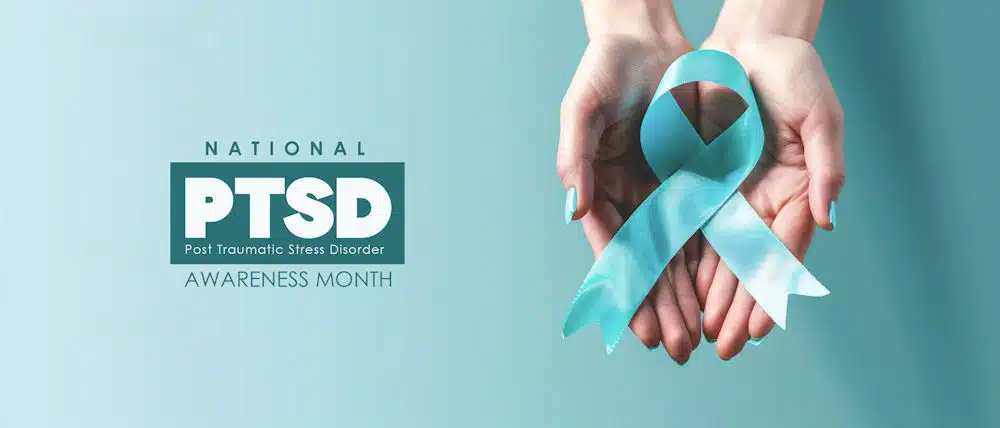
This June, Villa Kali Ma honors PTSD Awareness Month, a topic that’s very dear to our hearts.
We invite you to join us in a spirit of gentle understanding, with patience for yourself and all of humanity.
What is the importance of PTSD Awareness Month?
Post-traumatic stress disorder, or PTSD, is relevant for many of us, not only the veterans among us. While PTSD Awareness Month specifically honors those among us with clinical levels of traumatization, the truth is that complex adaptive trauma is widespread and often undiagnosed.
The more we learn about trauma, the more we see that traumatization, or the wounding of the human psyche, underlies the many struggles we face as the human race.
Trauma leads to substance addiction, self-harm, and abuse of others. Trauma underlies the emotional and social disconnection and fragmentation that we see playing out in the world in many ways.
Some might say that the extreme imbalances we see in the world – the injustice and the desecration of the natural world, including human life – are only possible to be carried out by a severely traumatized population. Only the sides of us that are numbed, divorced, and alienated from our human hearts and spirits can participate in destruction without feeling the unnaturalness of what we are doing.
Trauma underlies the cycle of victimization, as the wounded among us enact their wounding on every next generation of humans, animals, plants, and materials of the earth.
And yet, it all makes sense! When we understand how trauma shatters, splits, and distorts us into inversions of our true human nature – making us violent, heartless, and dissociated – we can see that until humanity’s trauma is healed, little progress will take place.
Can we realistically expect people to treat each other, or planet Earth, with regard and tenderness, when we haven’t yet learned to treat ourselves as deserving of safety and protection from harm?
Every path of healing the wholeness is welcome. Still, those of us who are drawn to focus especially on the inner work of transformation understand that trauma is one of the biggest obstacles we face, especially as women.
As a collective, we’re going to have to heal what happened to the humans, before we can understand why we behave how we do, why we’re addicted and brokenhearted and psychologically ill.
Here at Villa Kali Ma, we are ever and always dedicated to healing PTSD, erasing this heartbreaking syndrome forever from the minds, hearts, and bodies of women.
What is PTSD?
Post-traumatic stress disorder is the clinical name for a grouping of symptoms and experiences that first gained notoriety after the World Wars when it was called shell shock.
Observing that veterans came home with shattered nervous systems and that wars destroy people, was the origin of a deeper investigation of trauma and how it works.
Since those beginning inquiries into what we now recognize to be trauma, the field has continued to progress by leaps and bounds, gradually revealing how it is that humans came to be in the state we are now.
While traumatization is widespread, it is less common to be diagnosed with the clinical syndrome called Post-Traumatic Stress Disorder. To receive a clinical diagnosis of PTSD, certain criteria have to be met, which indicate that a person has traumatization to such a degree that it is severely disrupting their ability to live life.
PTSD is often diagnosed among combat veterans, for obvious reasons, but it may develop in response to any life event which was experienced as life-threatening, terrifying, or extremely violating.
It is noteworthy to us at Villa Kali Ma that the majority of people receiving a diagnosis of PTSD are women, despite the far smaller number of female combat veterans.
What are the symptoms of PTSD?
Symptoms of traumatization in general include anxiety, panic, irritability or rage, intense feelings of dread and overwhelm, sleep problems (including nightmares and terrors), and preoccupation with a disturbing event or events.
It is common to adapt one’s behavior to avoid reminders of a traumatic incident, which can result in developing a substance addiction and/or social isolation as a way to manage exposure to triggers.
Triggers are signals in the environment or within one’s subjective perceptions that are armed to activate the nervous system and flood a person with very intense emotions and reactivity.
Four main symptoms of PTSD are used to diagnose it clinically. Individual people will experience their PTSD in somewhat unique and personal ways, nevertheless, these can be guidelines and markers to recognize the disorder’s presence.
Please keep in mind that all of us can relate to these markers to some degree, and that technically we only qualify for a diagnosis of PTSD if our symptoms disrupt our capacity to meet our life responsibilities.
That said, all trauma is deserving of our loving attention to heal it – we don’t need a medical diagnosis to permit us to heal our soul’s wounding. We all deserve all the help we need, no matter who we are.
Four main indicators of PTSD are:
1. Re-living, or re-experiencing the disturbing event.
Essentially, when we have trauma our nervous systems get stuck in such a way that we re-live the event psychologically – emotionally, and sometimes even perceptually – even though the event itself is over. This can take the form of having flashbacks, nightmares, or getting triggered into feeling like the same thing is happening again.
2. Avoidance of Triggers
It’s common for people with PTSD to avoid unpredictable situations, including social gatherings and even close relationships with people, because of the fear of getting triggered.
3. Negative Thoughts and Feelings
It is part of PTSD to live with constant, severe anxiety and negative thinking. The ability to trust or expect life to be a positive experience is eroded. Other impacts of traumatization include overwhelming emotions of intense guilt, shame, rage, dread, fear, and numbing.
4. Hyperarousal
People who have PTSD are often edgy and wound up, because they are in a state of chronic unease, looking out for danger. This hyper-vigilance makes it difficult to relax, sleep, have joy, or experience pleasure. This factor of PTSD also contributes to a tendency towards substance addiction.
What are the facts of PTSD?
According to statistics shared by the National Center for PTSD, which is part of the United States Department of Veterans Affairs, 6% of Americans will develop PTSD at some point in their lifetimes.
The average number of adults in the United States with PTSD is about 12 million in any given year. About 5% of the current population has PTSD.
The incidence of PTSD is higher among women – of every 100 women, 8 will develop PTSD in their lifetimes, whereas of every 100 men, 4 will develop PTSD.
Villa Kali Ma supports National PTSD Awareness Month
For us at Villa Kali Ma, there is no greater issue than how to help women heal their trauma.
Women are a powerful force of love, intelligence, and creativity. We are nurturers, geniuses, engineers, spiritual leaders, mothers, and workers. But we are also vulnerable, as many aspects of our current world could be tagged as Not Safe For Women.
Recovery from PTSD, this heartbreaking disorder that disproportionately affects women, begins with restoring a deep, unshakeable safety in the hearts and bodies of women. This is our ongoing goal.



